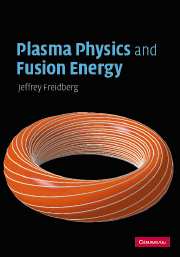Book contents
- Frontmatter
- Contents
- Preface
- Acknowledgements
- Units
- Part I Fusion power
- 1 Fusion and world energy
- 2 The fusion reaction
- 3 Fusion power generation
- 4 Power balance in a fusion reactor
- 5 Design of a simple magnetic fusion reactor
- Part II The plasma physics of fusion energy
- Appendix A Analytical derivation of 〈ς v〉
- Appendix B Radiation from an accelerating charge
- Appendix C Derivation of Boozer coordinates
- Appendix D Poynting's theorem
- Index
- References
1 - Fusion and world energy
Published online by Cambridge University Press: 14 May 2010
- Frontmatter
- Contents
- Preface
- Acknowledgements
- Units
- Part I Fusion power
- 1 Fusion and world energy
- 2 The fusion reaction
- 3 Fusion power generation
- 4 Power balance in a fusion reactor
- 5 Design of a simple magnetic fusion reactor
- Part II The plasma physics of fusion energy
- Appendix A Analytical derivation of 〈ς v〉
- Appendix B Radiation from an accelerating charge
- Appendix C Derivation of Boozer coordinates
- Appendix D Poynting's theorem
- Index
- References
Summary
Introduction
It has been well known for many years that standard of living is directly proportional to energy consumption. Energy is essential for producing food, heating and lighting homes, operating industrial facilities, providing public and private transportation, enabling communication, etc. In general a good quality of life requires substantial energy consumption at a reasonable price.
Despite this recognition, much of the world is in a difficult energy situation at present and the problems are likely to get worse before they get better. Put simply there is a steadily increasing demand for new energy production, more than can be met in an economically feasible and environmentally friendly manner within the existing portfolio of options. Some of this demand arises from increased usage in the industrialized areas of the world such as in North America, Western Europe, and Japan. There are also major increases in demand from rapidly industrializing countries such as China and India. Virtually all projections of future energy consumption conclude that by the year 2100, world energy demand will at the very least be double present world usage.
A crucial issue driving the supply problem concerns the environment. In particular, there is continually increasing evidence that greenhouse gases are starting to have an observable negative impact on the environment. In the absence of the greenhouse problem the energy supply situation could be significantly alleviated by increasing the use of coal, of which there are substantial reserves.
- Type
- Chapter
- Information
- Plasma Physics and Fusion Energy , pp. 3 - 20Publisher: Cambridge University PressPrint publication year: 2007



